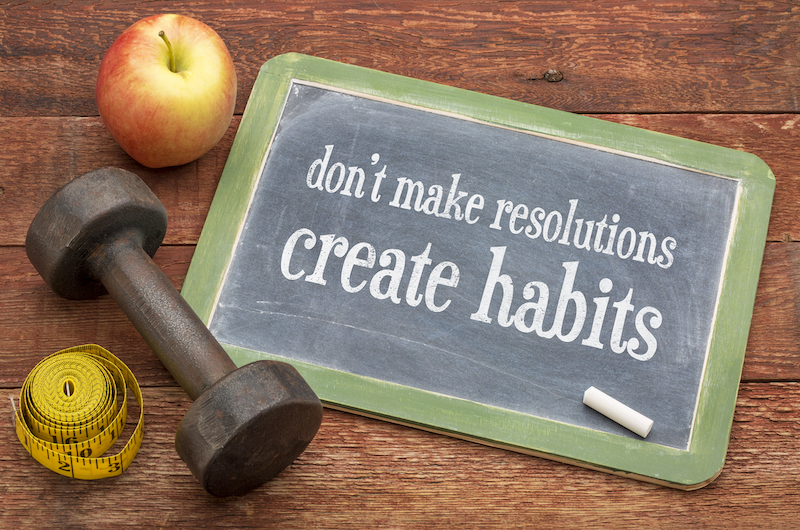Habits, not resolutions, is the key to achieving your dreams in 2021. Now is the time for this well-worn cultural tradition to change into something sustainable.
Why you should drop New Year’s resolutions, which often fail anyway
The research on achieving New Year’s resolutions is not good, so why do we keep doing this anyway? I wonder if it has something with the desire for a fresh start? Turning the calendar into a new year gets us thinking about what matters most. We recognize that life should be different. Too often that means wishing our energy was higher, our waist size was smaller, etc. These holiday pounds can be troubling for sure! I think there is something noble and good about New Year’s resolutions. But still, they should be dropped.
What about my goals?
Ok, you might be saying, “I hear that resolutions are not worth much. But what about my goals? I always update those.”
I’m not gonna knock those, or tell you not to set goals in the New Year. In fact, I always reset my goals at the end of December. Why?
- January 1 is the start of a new quarter. I’ve talked previously about doing a quarterly review, so now is the time to do that.
- Some things are best articulated as big, hairy, audacious goals that deserve focus on as something to achieve.
- Often the reason we form a habit is because we have some goal in mind. I’ve most often experienced that my goals and my habits go hand in hand.
Ok, so let’s hone in a little more on how habits can relate to our goals.
Why you should focus FIRST on your habits before your goals
Say you have an important goal for 2021: to be fit. Well, that’s a worthwhile resolution. It’s not really a goal yet. To make it a goal you’d need to get more specific and measurable and decide when you are going to achieve it, what it will look like when you do, etc. Right? Ok, so you decide you want to lose 10 pounds by midwinter break in February. That’s about 1.5 pounds per week or so which is aggressive but doable.
But then the next question is, how are you going to achieve it? You’ll likely need to take on some new activities like eating differently, moving your body more, and so on. And, to make progress, you’ll need to develop a routine to do this consistently. That first week is great. You’re up early every morning, you’re moving your body, and you had so many special treats and drinks over the holidays that you’re kinda glad to be eating salad again. But then the winter doldrums of January continue and the grind of work returns. You start looking to those same old coping strategies for boredom, stress, etc. That Diet Coke in the afternoon. The box of crackers after dinner while watching West Wing. The need to sleep in a little more because you surfed Facebook a little late in bed last night just looking for distraction.
The problem is not that you didn’t have a good intention, or resolution. Especially if you said “to be fit I’m going to lose 10 pounds by February by eating better and exercising more .” Well, you could have made that a better and more specific goal. But, the real problem is that the systems in your life, I.e. your habits, did not set you up to more easily achieve your goal.
In reality, habits are more foundational to goals, when it comes to achieving real, sustainable change. Good habits create the environment for good goals to flourish.
Start small to keep consistent
Changing habits can be difficult. Which is why changing everything all at once is almost impossible. You’ll have a tendency to pull back to old habits — think of a rubber band which naturally pulls back to its position when the tension is released.
The key is to start small. Pick the most important habits. I suggest keystone habits. Decide which habits will, over time, lead to the kind of result that our big goal describes. So that goal of being fit is really about changing our habits of eating and movement. Starting small would probably mean starting with replacements of our unhealthy snacks with something healthy. Or it might include replacing some standard, carbohydrate and processed meals with some fresh and whole food, non-processed options — good lean proteins and vegetables. In term so of movement maybe starting with 15 minutes of movement daily—like a brisk walk right when we come home and before we start making dinner. Then we can build up from there once we have established those small habits.
The key is to determine something that important enough that it will begin to impact our life, but small enough that we will be more likely to sustain. Once it catches hold it becomes like a flywheel that has a momentum of it’s own.
Give it a try in 2021! We are 8 days into a New Year and you might still have energy for those resolutions. But how long will it last? How about thinking through the habits that lead to that resolution and starting building those today? You got this!
Question: What resolution for the New Year can you convert into some small, incremental habit changes?
Leave a comment or drop me an email and let me know whether you found this post helpful. Stay focused and positively moving forward on the path this week.
All the best,
Jeff
